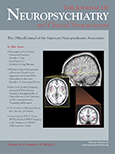Fluoxetine-Induced Pulmonary Hypertension in a Patient With Schizophrenia
To the Editor: Serotonin, the primary monoamine implicated in the pathophysiology of depression, can be synthesized in the pulmonary endothelium. Recent animal and clinical studies have illuminated the role of serotonin in the development of pulmonary hypertension and the possible effects of selective serotonin reuptake inhibitors (SSRIs) on pulmonary vasculature in adults and fetuses.1 The authors report a case of pulmonary hypertension induced by the SSRI fluoxetine in a patient with schizophrenia, which resolved after stopping the medication.
Case Report
“Ms. J,” a 29-year-old single woman, presented to the outpatient services of the National Institute of Mental Health and Neuro Sciences with a 3-year continuous illness characterized by delusion of love, auditory hallucinations, sexually disinhibited behavior, reduced self-care, and reduced functionality. She was diagnosed with paranoid schizophrenia and admitted into the ward. She had previously received adequate trials of trifluperazine (20 mg), risperidone (6 mg), olanzapine (20 mg), haloperidol (30 mg), and ziprasidone (120 mg), with minimal improvement. From then until time of admittance, she was being treated with clozapine (doses ranging from 400 to 900 mg) and had a fluctuating course, with one episode of seizures and significant weight gain. She was lost to follow-up for 5 years, while she continued to receive treatment elsewhere. During this time, she received amisulpiride (600 mg), and fluoxetine 60 mg was added, probably for depressive symptoms, which she continued to receive until admission to the hospital. She returned to us with exacerbation of her psychiatric symptoms and exertional dyspnea. A cardiac evaluation revealed moderate pulmonary hypertension, mild mitral and tricuspid regurgitation, and concentric left ventricular hypertrophy on echocardiography. There was no evidence of myocarditis, pulmonary angiography ruled out the presence of a pulmonary embolism, and polysomnography was normal. She was a nonsmoker. Following this, fluoxetine was tapered and stopped over 2 weeks, and other medications (clozapine 400 mg, amisulpiride 600 mg, and valproate 750 mg) were continued. She was advised to take ambrisentan by a pulmonologist, which she did not take. She was again lost to follow-up for 10 months, after which she presented with exacerbation of her psychiatric symptoms. During this time, she had continued all previous medications except fluoxetine. A repeat cardiac evaluation showed normal valves and chambers with normal biventricular function, and no evidence of pulmonary hypertension.
Discussion
The SSRIs are known to induce proliferation of cells, and there have been reports of SSRI-induced pulmonary hypertension in newborns with in utero exposure to SSRIs.1,2 Serotonin is synthesized in the vascular endothelium and is a potent pulmonary vasoconstrictor. Adult pulmonary hypertension is associated with local alterations in serotonin signaling and metabolism.3 Animal models of pulmonary hypertension have also shown that there is increased activity of tryptophan hydroxylase, the rate-limiting enzyme for serotonin synthesis, in pulmonary vascular endothelial cells.4
At this point, data supporting a link between SSRI exposure and pulmonary hypertension are weak. Many lifestyle factors associated with schizophrenia/depression may account for the association. However, clinicians need to be aware of this rare adverse effect in patients who develop respiratory or cardiac symptoms during the course of SSRI treatment.
1 : Persistent pulmonary hypertension of the newborn and selective serotonin reuptake inhibitors: lessons from clinical and translational studies. Am J Psychiatry 2012; 169:134–140Crossref, Medline, Google Scholar
2 : Pulmonary hypertension and the serotonin hypothesis: where are we now? Int J Clin Pract Suppl 2007; 156:27–31Crossref, Medline, Google Scholar
3 : Cross talk between endothelial and smooth muscle cells in pulmonary hypertension: critical role for serotonin-induced smooth muscle hyperplasia. Circulation 2006; 113:1857–1864Crossref, Medline, Google Scholar
4 : How the serotonin story is being rewritten by new gene-based discoveries principally related to SLC6A4, the serotonin transporter gene, which functions to influence all cellular serotonin systems. Neuropharmacology 2008; 55:932–960Crossref, Medline, Google Scholar



